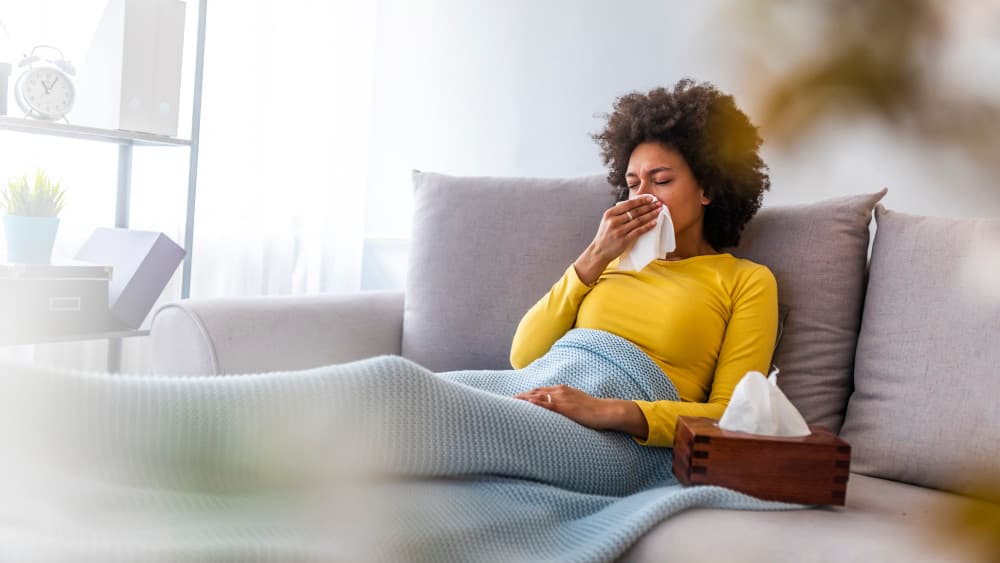How to Tackle Spring Allergies With Innovative Healthcare

7 Minutes

Team Curative

May 19, 2025
As the snow melts and the first buds of spring appear, so too do the symptoms of seasonal allergies for many people. These allergies cause discomfort and inconvenience to those sensitive to pollen-filled air. However, with the right preventive care measures, it is possible to enjoy the beauty of spring without the usual dread of allergy season.
Understanding the spring allergy season
When everything is coated in yellow dust, you know spring has arrived — and for many, that means allergy season is in full bloom. Pollen from trees, grasses, and weeds is the primary culprit behind spring allergies, and symptoms can appear suddenly and escalate quickly. Fortunately, innovative healthcare solutions are transforming the way we approach allergy relief, making it easier to personalize treatment and stay ahead of symptoms.
The type and severity of allergies can vary widely depending on your region, as different plants pollinate at different times across the country. For example, tree pollen tends to spike in early spring, while grasses and weeds take over later in the season. Knowing these regional patterns — and having access to modern tools that track them — is essential for managing symptoms effectively. And while pollen is the most common trigger, there are other, less obvious contributors to spring allergies, including:
Stress: Stress levels often rise in spring and can exacerbate allergy symptoms. In fact, a recent Pulmonology Advisor article noted, “Not only do allergies potentially worsen mood disorders, but the stress and anxiety from mood disorders can, in turn, amp up allergic responses.”
“Foreign” pollen: Pollen can travel hundreds of miles, which means you could be affected by pollen from far-flung areas, not just your local flora.
Weather: Thunderstorms can significantly affect pollen distribution and allergy symptoms. While rain typically washes pollen away, thunderstorms can stir up pollen, leading to increased allergy flare-ups post-storm. This phenomenon, sometimes called "thunderstorm asthma," can be particularly challenging for allergy sufferers.
Ladybugs: Though not very common, certain species of ladybugs have been found to cause allergic reactions in some individuals. As the weather warms up, these ladybugs become more active, potentially leading to increased allergy symptoms for those affected.
Whether it’s pollen or something more unexpected that causes your symptoms to flare up, identifying your triggers is the first step. From smart allergy tracking tools to personalized treatment plans, innovative healthcare makes it easier than ever to manage your symptoms with precision and ease.

How to know if it’s allergies or just a cold:
You don't feel well, but you're unsure if you're sick or reacting to whatever's blooming in your neighborhood. Distinguishing between colds and allergies can sometimes be challenging due to overlapping symptoms. However, there are key differences that can help make the diagnosis easier:
Common Cold Symptoms
Sore throat: Often one of the first signs of a cold.
Runny nose: Usually starts with clear mucus, which becomes thicker and cloudier.
Cough: Develops as the cold progresses.
Fever: Not always present but is a clear indicator of a cold rather than allergies.
Body aches: A general feeling of being unwell is common with a cold.
Duration: Colds usually last about 3 to 10 days.
Allergy Symptoms
Itchy eyes/nose/throat: This is more specific to allergies, particularly when it affects the eyes.
Runny nose: The mucus is typically thin and clear, similar to the early stages of a cold, but persists this way.
Sneezing: Often more frequent and intense in allergy sufferers, especially in response to specific triggers.
No fever: Allergies do not cause a fever.
Chronic symptoms: Allergy symptoms can last for weeks or as long as the person is exposed to the allergen.
Diagnosis Tips
Look at the duration: If symptoms last more than two weeks, it's likely allergies.
Consider the time of year: Colds are more common during winter, while allergies may flare up during specific seasons (like spring for pollen).
Observe symptom patterns: Recurring symptoms at the same time each year are indicative of allergies.
Check for fever: A fever is a sign of a cold, not allergies.
Notice the type of sneeze: Rapid and numerous sneezes are typical for allergies.
Innovative healthcare is making it easier than ever to differentiate and manage cold and allergy symptoms with greater accuracy and speed. But if you're genuinely unsure where your symptoms are coming from, it's always best to consult a healthcare professional for a clear diagnosis and the right course of treatment.
Treating allergy symptoms with innovative healthcare
When allergy symptoms strike, most people turn to familiar remedies like antihistamines, nasal sprays, eye drops, and decongestants. And while these over-the-counter options are helpful, innovative healthcare models are making it easier to go beyond surface-level relief and access more personalized, long-term solutions.
By removing cost barriers like copays and deductibles, some health plans are helping people connect with allergists earlier and more often, without the traditional hoops. This streamlined access means that instead of guessing what's triggering symptoms, members can get tested and start targeted treatment sooner. In some cases, allergy testing and immunotherapy, such as injections or oral drops, are fully covered when prescribed and administered by a specialist.
Even more helpful? Building an ongoing relationship with a dedicated provider who understands your full health picture and can incorporate allergy care into a broader, long-term health plan. That kind of proactive, continuous care is redefining how we manage seasonal allergies from year to year.

When to see a medical provider about allergies
Most allergy symptoms eventually fade as seasons change, but when they persist, escalate, or disrupt your daily life, it may be time to consult a medical provider. This is especially true if over-the-counter medications aren’t providing relief, or if you're dealing with recurring sinus infections, asthma complications, or uncertain triggers.
In these cases, innovative healthcare approaches are making it easier to get the answers and care you need. Providers can offer comprehensive allergy testing, prescribe stronger medications, and develop personalized treatment plans, which may include immunotherapy, such as allergy shots or oral drops, to gradually reduce your sensitivity to allergens. While allergies can’t always be cured, having direct access to specialists and long-term care strategies can dramatically improve your quality of life.
The role of innovative healthcare in allergy management
Managing seasonal allergies requires having a long-term care strategy that adapts to your needs. That’s where innovative healthcare can make a big difference. Establishing a relationship with a dedicated provider allows you to catch allergy trends early, get the right referrals for testing or treatment, and tailor a plan that fits your lifestyle.
Curative is reimagining what care like this looks like. With three affordable health insurance plans — EPO, PPO, and PPO+ — Curative offers $0 copays, $0 deductibles, and no out-of-pocket costs for covered services when members complete a Baseline Visit within the first 120 days. That includes access to in-network allergists, allergy testing (like skin tests and RAST), and immunotherapy treatments such as allergy injections or oral drops when prescribed by your provider.
More than just insurance, Curative connects each member with a dedicated Care Navigator to help build a personalized care plan from day one, including strategies for managing allergies throughout the year. With 24/7 telehealth access, $0 medications through the Curative Pharmacy, and wellness benefits built into every plan, getting support for your allergy symptoms has never been simpler or more affordable.
To see all disclaimers, please view them here.
About Curative
Curative is a health plan employees love for its affordability, engagement, and simplicity. With $0 copays and deductibles, members can get the care they need when they need it without the financial burden. Imagine — a health plan that actually delivers better health without hurting your wallet.
To learn more, check out Curative for Members.
Resources
American Academy of Allergy, Asthma & Immunology. (13 Nov 2023). Allergy shots (immunotherapy). https://www.aaaai.org/tools-for-the-public/conditions-library/allergies/allergy-shots-(immunotherapy)
American College of Allergy, Asthma & Immunology. (n.d.). Pine tree allergy. https://acaai.org/allergies/allergic-conditions/pine-tree-allergy/
American College of Allergy, Asthma & Immunology. (n.d.). Seasonal allergies. https://acaai.org/allergies/allergic-conditions/seasonal-allergies/
Bradley, J. (2024 March 13). There’s a scientific reason you’re feeling impulsive and restless this time of year. An expert explains. Fortune. https://fortune.com/well/2024/03/13/restless-impulsive-feelings-spring/
Cleveland Clinic. (16 Feb 2024). Allergy testing. https://my.clevelandclinic.org/health/diagnostics/21495-allergy-testing
Feld, J. J. (2024, April 12). Seasonal allergies often accompanied by mental health and sleep disorders. Pulmonology Advisor. https://www.pulmonologyadvisor.com/features/seasonal-allergies-and-mental-health-sleep-disorders/
Harvard Health Publishing. (2022 June 22). Thunderstorm asthma: Bad weather, allergies, and asthma attacks. https://www.health.harvard.edu/blog/thunderstorm-asthma-bad-weather-allergies-and-asthma-attacks-202206222766
Mayo Clinic. (13 Feb 2024). Common cold: Expert answers. https://www.mayoclinic.org/diseases-conditions/common-cold/expert-answers/common-cold/faq-20057857
Mayo Clinic. (05 Mar 2022). Allergy medications: Know your options. https://www.mayoclinic.org/diseases-conditions/allergies/in-depth/allergy-medications/art-20047403
Miller, K. (2021 March 8). Ladybug allergies? It's a thing. Check out these 6 weird allergies, according to experts. Yahoo! Life. https://www.yahoo.com/lifestyle/spring-awakening-6-weird-spring-allergies-140021503.html
U.S. News & World Report. (8 May 2020). When to see an allergist. https://health.usnews.com/conditions/articles/when-to-see-an-allergist
Sign up for our Newsletter
Table of Contents
Understanding the spring allergy season
Treating allergy symptoms with innovative healthcare
When to see a medical provider about allergies
The role of innovative healthcare in allergy management
Resources








